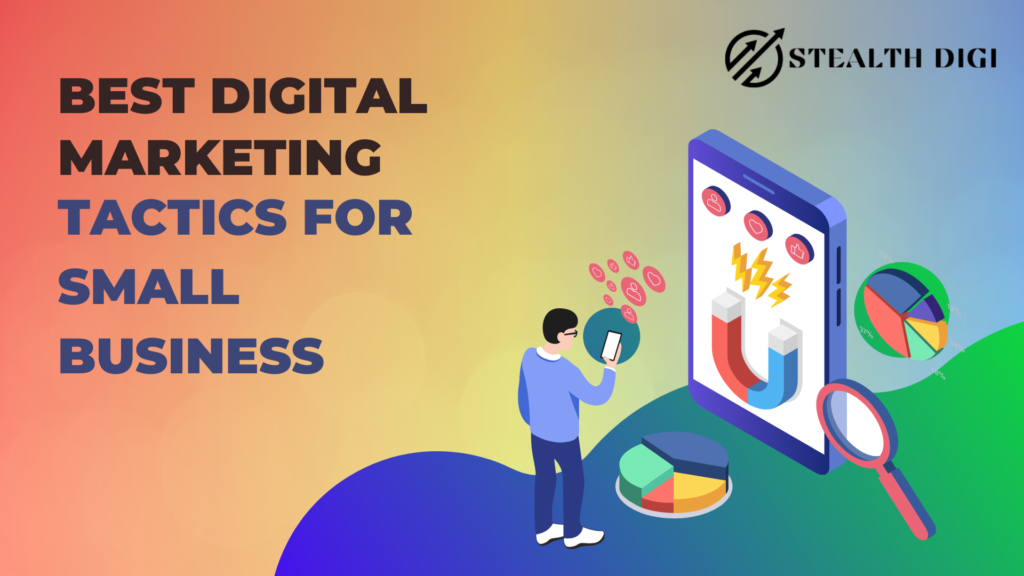Best Digital Marketing Tactics for Small Business
Introduction:
Establishing an effective digital footprint for any small business today is absolutely crucial to its success in today’s digital environment. Although digital marketing may appear complex at first, with proper strategies in place small companies can utilize digital to expand their reach, engage their target market, and ultimately drive expansion and drive growth.
We will explore the top digital marketing tactics specifically tailored to small businesses in this article, from search engine optimization and social media marketing through to developing actionable strategies and insights designed to help your organization excel in today’s online marketplace. If you are new to digital efforts or hoping to enhance existing ones, this guide provides all of the tools and knowledge necessary for you to achieve digital success for any small business. Let’s dive right in and unlock its digital potential together!
Crafting a Digital Marketing Strategy.
Success in today’s digital economy often depends upon having an effective marketing strategy in place, particularly for small businesses. Crafting an effective digital marketing plan means setting yourself apart among fierce competition while reaching target customers effectively – here are key components for crafting one:
Identifying Goals and Objectives:
Before diving headfirst into digital marketing, it’s essential to set realistic and SMART objectives – whether your aim is increasing website traffic, generating leads or sales or building brand recognition, setting clear objectives will give direction for your efforts.
Target Audience Analysis and Competitor Research:
Understanding your target audience is vital in crafting a successful digital marketing strategy. Conduct in-depth research to pinpoint their demographics, interests, behaviors and pain points so that you can tailor marketing messages and tactics specifically targeting these audience segments. Analyzing competitor digital presences also can provide vital insights into industry trends, consumer preferences and any gaps within the market that need filling.
Developing a Comprehensive Strategy:
With clear goals and an intimate knowledge of your target audience in hand, it’s time to craft an extensive digital marketing plan. Your strategy should incorporate various digital channels and tactics aligning with business goals; including search engine optimization (SEO), content marketing, social media marketing, email marketing and pay-per-click advertising as organic strategies; these should all work synergistically together in maximizing reach, engagement and conversions.
Execution and Management Tips:
Once your digital marketing strategy is in place, its implementation and management are essential to its success. Allocate resources efficiently so your strategy is implemented efficiently; track key performance indicators (KPIs) regularly so as to track campaign progress; use data-driven decisions as needed in optimizing results from campaigns; monitor KPIs regularly so you know if changes should be made accordingly to optimize campaigns further. Staying current with industry trends, algorithm changes and emerging technologies is vital in adapting your strategy successfully and staying ahead of the game.
Measuring and Analyzing Performance:
Tracking the success of your digital marketing initiatives is vital in order to evaluate its efficacy and identify areas for improvement. Use analytics platforms or tools like Google Analytics or SimilarWeb in order to monitor metrics such as website traffic, conversion rates, click-through rates and return on investment (ROI) rates; analyze this data as you uncover insights as to what’s working well versus where adjustments need to be made for continued improvements over time.
Iterating and Optimizing Campaigns:
Digital marketing is an ever-evolving practice that relies on optimization for long-term success. Analyse insights gleaned from performance metrics to continually hone and modify campaigns; test different messaging, visuals, targeting options and call-to-actions until finding those which prove most successful; embrace experimentation and adaptation to ensure that your digital marketing remains dynamic in response to changing market conditions and consumer tastes.
Crafting a digital marketing plan tailored to the goals, audience and resources of your small business is key to its continued growth in today’s digital environment. By following these key steps and principles, you can develop an actionable roadmap that will guide digital marketing efforts while further propelling forward growth of your enterprise.
Core Digital Marketing Tactics:
Small businesses must embrace digital marketing tactics as a vital way of reaching and engaging their target audiences effectively, to drive growth. Here are a few core tactics they should leverage in their digital strategies:
Search Engine Optimization (SEO):
SEO (Search Engine Optimization) refers to optimizing a website so it ranks higher in the Search Engine Results Pages (SERPs), thus increasing organic traffic and driving sales leads. Small businesses can enhance their SEO strategies by conducting keyword research to identify pertinent search terms, then including them strategically into website content, meta tags and URLs; optimizing speed by improving site navigation as well as earning quality backlinks from authoritative sources may further bolster performance of their SEO campaigns.
Content Marketing:
Content marketing refers to creating and disseminating relevant, valuable content to attract and keep a target audience. Small businesses can utilize content marketing by producing high-quality blog posts, articles, videos, infographics or any multimedia media which address their audience’s needs, pain points or interests – these should then be shared across various channels such as social media sites like social media pages/feeds and email newsletters or guest blogging to maximize its reach and impact.
Social Media Marketing:
Social media marketing entails using various social media platforms to engage your target audience, build brand recognition and drive engagement and conversions. Small businesses can take advantage of social media marketing by identifying which platforms their target audiences spend most time using and creating engaging, shareable content which resonates with them – as well as engaging followers by running targeted ads or forging influencer partnerships to boost marketing efforts further.
Local Search Optimization:
Local search optimization involves improving a business’s presence in local search results for location-specific queries. Small businesses can do this by claiming and optimizing their Google My Business listing, maintaining consistent business information across online directories, encouraging customer review writing services to leave positive reviews on these directories, encouraging satisfied customers to post positive reviews about them online as well as targeting local keywords with location specific content to boost local rankings further.
Email Marketing:
Email marketing involves sending targeted messages to an opt-in list with the purpose of nurturing leads, retaining customers, and driving conversions. Small businesses can utilize email marketing by building quality email lists through website sign-ups, lead magnets and customer opt-ins. Customizing email content based on subscriber behavior segmentations lists to optimize engagement and maximize return. Automating campaigns further increase effectiveness and return.
Pay-Per-Click (PPC) Advertising:
PPC advertising allows businesses to bid on keywords and display prominent ads within search engine results and on other websites. Small businesses can take advantage of PPC by conducting in-depth keyword research, designing engaging ad copy/visuals/and targeting specific demographics/interests/behaviors with this form of promotion, monitoring campaign performance by adjusting bids/targeting settings as needed and optimising landing pages to ensure maximum effectiveness of PPC ads campaigns.
Video Marketing:
Video marketing entails producing and sharing engaging, informative videos in order to connect and build relationships with an audience effectively. Small businesses can utilize video marketing by producing informative and captivating clips about their products or services, customer testimonials or providing educational material – sharing these videos on social media platforms like social networks such as YouTube or embedding them onto website pages as well as optimizing video metadata will increase exposure and engagement significantly.
Influencer Marketing:
Influencer marketing refers to collaborating with influential people or brands in order to market your product or service directly to their audience. Small businesses can utilize influencer marketing by finding influential figures who target the same demographic, building relationships with them and working together on sponsored content or product endorsements with them. Measuring their impact and choosing influencers who align well can ensure successful campaigns.
Small businesses can leverage these core digital marketing tactics to establish an impressive online presence, attract qualified leads and drive meaningful engagements and conversions. Combining them strategically while monitoring performance will optimize digital marketing efforts for sustainable growth in today’s highly-competitive digital environment.
Implementing Digital Marketing Strategies
Implementing digital marketing strategies effectively is crucial for small businesses to achieve their marketing goals and drive growth. Let’s delve into the key steps and considerations for executing and managing digital marketing strategies:
Allocation of Resources:
Before embarking upon digital marketing strategies, it’s imperative that resources are strategically distributed. Consider budget, manpower and time requirements when assigning resources for various tactics within your strategy; consider outsourcing certain tasks like content production or pay per click management as needed to maximize impact of digital efforts. By strategically allocating these resources you will maximize their effect.
Execution of Strategy:
With resources at your fingertips, now it is time to implement your digital marketing strategy. Make sure all components of it are implemented successfully and as planned – including creating and scheduling content, setting up ads campaigns, optimizing website elements for SEO purposes and engaging with audiences via social media channels – consistency and attention to detail are keys for ensuring its successful execution.
Monitoring Key Performance Indicators (KPIs):
As part of your digital marketing strategies, it’s crucial that you monitor key performance indicators (KPIs) regularly in order to measure their efficacy. Common KPIs include website traffic, conversion rates, click-through rates, engagement metrics and ROI — these tools and platforms allow for data gathering so you can gain an accurate view into campaign performance and make data-driven decisions about where improvements can be made and areas for improvements that require attention.
Making Data-Driven Decisions:
Utilizing data gleaned from digital marketing efforts is vital in making informed decisions and optimizing strategy. Use insights gained through analytics tools to detect patterns, trends and areas of opportunity within your strategy – for instance if certain ads or campaigns have high conversion rates consider allocating more budget towards them; otherwise if certain tactics underperform, modify approaches accordingly in order to enhance performance results.
Optimization of Tactics:
Optimization in digital marketing is an ongoing practice that must be managed for optimal performance and results. Regularly monitor your tactics to boost performance and achieve greater outcomes; test different messaging, visuals, targeting options and ad formats with your target audience in order to find those which resonate the most based on KPI data collected during KPI monitoring sessions – creating a culture of optimization can increase the long-term efficacy of digital marketing initiatives over time.
Adaptation to Changes:
The digital landscape is constantly shifting with emerging trends, technologies, and algorithms forming within platforms’ policies or algorithms that require adaptation by marketers in their strategies for success in digital marketing. Stay abreast of industry news as well as changes to platforms policies or algorithms so your strategies adapt with ease – being flexible is key when staying ahead in this ever-evolving digital realm!
Integration of Feedback and Iteration:
Solicit feedback from customers, colleagues, and stakeholders in order to gain valuable insights into the effectiveness of your digital marketing strategies. Take notice of reviews and comments left by customers on social media or other channels so you can use this feedback to iterate and refine tactics continuously based on audience insights gathered during user testing and customer research. By listening closely and responding accordingly to what people tell you – whether its reviews, comments or otherwise -you will increase customer satisfaction and loyalty while strengthening relationships among your target market.
By following these steps and considerations, small businesses can successfully implement and manage their digital marketing strategies, yielding meaningful results while reaching marketing objectives. By allocating resources strategically, monitoring KPIs closely, making data-driven decisions, optimizing tactics as necessary and adapting quickly to changes, as well as gathering feedback, small businesses can maximize the impact of their efforts to drive sustainable growth within today’s highly competitive environment.
Additional Considerations:
As well as basic digital marketing tactics, small businesses must also carefully consider various factors to enhance their online presence, engage target customers efficiently and create sustainable growth. Let’s examine some key considerations for small businesses when marketing digitally:
Mobile Optimization and Responsive Design:
An increasing percentage of consumers access the web via mobile devices, so optimizing your website for mobile is of critical importance. Make sure your website features responsive design elements which adapt to different screen sizes and devices seamlessly for an engaging mobile experience as search engines give priority to websites which meet this standard in their algorithms.
Online Reputation Management:
Maintaining a positive online reputation for small businesses is vital in building trust with their audience and increasing customer retention. Monitor online reviews, mentions, and feedback across various platforms so any negative comments can be addressed promptly and publicly, while encouraging satisfied customers to leave positive testimonials that bolster your online standing. Actively managing your reputation allows your brand to increase brand perception while simultaneously drawing in new customers.
Budgeting and Cost Management:
Small businesses must make wise allocation decisions when allocating resources and controlling costs effectively, thus it’s imperative they carefully allocate and monitor expenses. Focus your resources and allocate your costs appropriately on marketing tactics with high return-on-investment (ROI) that align with business goals; cost-efficient strategies like content, social media and email marketing could maximize budget impact – review regularly to adjust as necessary according to performance or business priorities.
Customer Service Integration:
Outstanding customer service is at the core of every successful business – both online and off. Integrate customer support seamlessly into your digital marketing efforts by offering multiple support channels such as live chat, email and social media messaging for customer assistance. Respond quickly to customer inquiries, concerns and feedback as part of a commitment to ensuring customer satisfaction – this way you’ll build loyalty, increase repeat business, create positive word-of-mouth endorsement and foster word of mouth advertising!
Stay Updated on Industry Trends:
Staying abreast of industry news, best practices and emerging trends is essential to staying competitive and capitalizing on opportunities in digital marketing. Subscribe to industry publications, attend webinars or networking events regularly in order to stay abreast of changes and ensure proactive adaptation of digital strategies that provide an edge in your market.
Employing these additional considerations into their digital marketing strategy will enable small businesses to enhance their online presence, engage their target audiences efficiently and drive sustainable growth. By prioritizing mobile optimization, managing online reputation, budgeting wisely and providing excellent customer service; as well as staying abreast of industry trends – small businesses can navigate their marketing goals successfully in today’s complex digital environment with greater ease and meet all their marketing objectives with success.
Conclusion:
In conclusion, Mastering digital marketing is integral for small businesses looking to thrive in today’s highly-competitive landscape. By crafting an effective digital marketing strategy and executing core tactics efficiently while considering factors like mobile optimization, online reputation management, budgeting integration and keeping abreast of industry trends; small businesses can establish strong online presences while engaging their target audiences for sustained growth and driving lasting change in business performance. With dedication, strategic planning, continuous adaption they can use digital marketing effectively in reaching marketing objectives while succeeding digitally in today’s ever-growing digital era!



